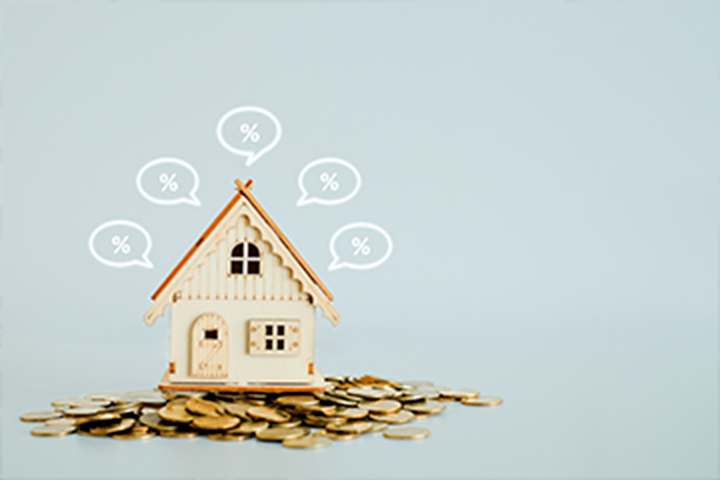Buying a second residence: with savings, investments or a loan?

Keytrade Bank
keytradebank.be
September 07, 2019
(updated February 09, 2022)
5 minutes to read
An apartment in De Panne, a studio flat in Leuven or a chalet in the Ardennes. Many compatriots have a second residence in addition to their primary residence, perhaps as many as over 400,000. Nobody knows the exact number, while studies on this topic are often based on surveys or rough estimates.
The fact that Belgians are champions in terms of property should come as no surprise. It doesn't matter whether the economy is suffering or not – investing in property remains our national sport. What's more, you're better off from a tax perspective as the government gives you all sorts of benefits when you invest in property. And if you rent out your second residence in Belgium to private individuals, you pay no tax on the actual rental income. This is something which is unique.
All of this means that the second residence market seems to be in top form. Indeed, one in four mortgages taken out in 2018 in Belgium was for the purchase of a second residence. In 2017, this figure was still one in five. Various factors have strengthened this trend in recent years: the low return on savings accounts and the extremely low interest rates on mortgages. Yet the volatility that returned to the stock markets in 2018 also drove some investors towards property. And while property is certainly not risk-free, many Belgians place firm trust in it.
To finance the purchase of a second residence in Belgium, you have three main options:
1. Savings
If you have enough in savings, you can draw on part of this reserve. After all, the capital you've put in the bank hasn't provided a decent return for several years. And thanks to the European Central Bank's policy, there is likely to be little or no change in this regard in the years to come.
But before you touch your savings, you should first map out in detail how much you wish to keep in reserve. Have you factored in all purchase costs for the second residence (fees, registration duties, etc.) as well as all future costs (renovations, insurance, taxes, etc.)? Will you rent the property out, or use it yourself? And do you keep enough aside to deal with any unforeseen expenses? What is certain is that as soon as you own two properties instead of one, a larger savings reserve is recommended. This is because there are always costs related to maintaining a property and because the chance of unforeseen expenses increases when you own two properties.
Your personal and family situation also play a part in determining how much you best keep in reserve, too. Do you have children (in education) or not? Are you 28 or 88 years of age? Are you single or not? And finally, your peace of mind is also important: while some can easily get through life with savings of one month's pay in reserve, others can sleep well only with savings of a hundred months’ salary.
‘Experts’ usually recommend a savings reserve of three to six months’ net pay. But you are the expert that counts when it comes to this issue. If you’d like to make a calculation, you can do so on the website of the independent institute, Nibud (Dutch National Institute for Family Finance Information). Although the calculation is mainly aimed at those living in the Netherlands, it will give you an idea of your ‘ideal’ buffer.
2. Investments
Investments are something you undertake for the long term. By taking your invested capital out early and starting again with a smaller amount of capital years later, your expected long-term return will be much lower.
If you're thinking about buying a second residence, it's a good time to look at the composition of your portfolio. Purchasing a second residence would change your financial situation significantly and you may well want to reduce the risk in your investments (on a temporary basis). by keeping more defensive investments, for example, or opting for investment funds which offer additional income through regular dividends.
3. Mortgage
The value of property (in Belgium at least) has been on the rise for decades. According to the most recent figures from Statbel (Q1 2019), detached houses have increased in value by 5.4% and apartments 2.8% in the past year alone. As interest rates are likely to remain low for years to come, there is a chance that property prices will continue to rise. It may therefore be a good time to buy a second residence.
By opting for a mortgage, you maintain the financial security of your savings buffer and the potential returns from your investments. You spread the purchase costs, continue to enjoy the current low interest rates and can also take advantage of a tax break. Taking out a loan for a second residence does not entitle you to the Flemish deduction [woonbonus], but it does entitle you to a federal tax break.
For a second residence, you may deduct the interest in the amount of your income from immoveable (land registry) property. In so doing this is removed, which results in a saving against the highest tranche of your income. This becomes significant with a second residence, as the tax authorities have increased the land registry income on tax returns by 40% to this end.
Capital repayments and premiums for any debt-balance insurance can offer you a long-term savings in terms of tax of 30% on an amount of at most 2,350 euros (2019 income year). This can therefore provide up to 705 euros per year. You may also include the capital paid off in 2019 on the first tranche of 78,440 euros of your loan. This tax break applies per person. This means that a couple are both entitled to 2,350 euros in deductible costs. Note, however, that as long as you declare your old loan for your first property, you will most likely be unable to benefit from a tax break on the capital repayments for the loan for your second residence, as the ‘tax basket’ will probably still be full of expenses for your first residence.


